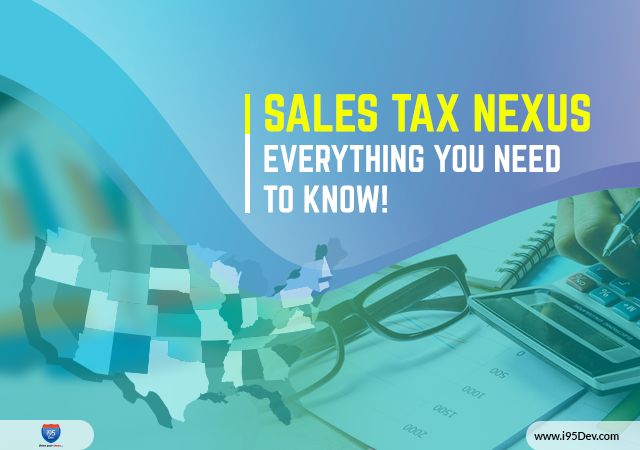Did you know that sales taxes date back to 2000 B.C.? Yes, it’s true, but we are pretty sure that you may not care when you find yourself swamped with a lot of paperwork. It becomes difficult figuring out how much your business owes to a state and when you also have to pay taxes in another state! Especially for online sellers, the word – nexus often reminds them of sales tax nexus.
The concept of sales tax nexus is confusing to many. Many pay it without understanding accurately what it is and how does it work? This article will give you everything you need to understand about it.
How did it begin?
On 21st June 2018, the United States’ Supreme Court passed its judgment in favor of the state in South Dakota v. Wayfair, Inc. The decision overruled a longstanding physical presence rule. It allows states to require remote sellers to collect and remit sales tax.
Since Wayfair, most states adopted the new rules that defined what establishes a sales and use tax obligation, known as nexus. However, for businesses, it was difficult as there were no two-state sales where tax nexus laws are alike.
As of now, over 40 states have enacted the nexus laws and the recent inclusion was Alabama and Arizona (1st October 2019). The next state to start implementing the sales tax nexus laws is expected to be Kansas.
Sales tax nexus: What is it?
Although there is not one specific definition across the 50 states, sales tax nexus can be understood in a broader sense. Broadly, it’s the tax that occurs when a business has any transactional connection to one of the states.
While every state has a different definition of sales tax nexus, generally an ‘economic connection’ (generating a number of sales in one state; it could be either a certain or fixed number of transactions or a certain dollar amount) or ‘physical presence’ is believed to create sales tax nexus.
Physical presence includes but is not limited to:
- Owning or renting an office
- Having a mailing address
- Having a warehouse
- Having employees
- Maintaining inventory stores
- Having an affiliate
Definitions
Click-Through Nexus – If a retailer or service provider contracts with an individual or company located in-state who directly or indirectly refers potential customers to the retailer through a web link for a sale’s commission or any other consideration, it was considered that the retailer should maintain a place of business in that state. Thresholds apply and vary by state. Pay-per-click, banner and other advertising do not qualify if payment is not contingent upon a sale.
Affiliate Nexus – An affiliated person of the retailer with a physical presence, or employees or agents in the state, has sufficient nexus in the state to require the retailer, collect and remit sales and use taxes on taxable retail sales of tangible personal property or services. Some states have expanded these provisions to include activities by unrelated parties performed on the seller’s behalf.
Economic Nexus – It usually correlates with the pre-set level of sales or the gross receipts activity within the state. No physical presence is required.
Marketplace Nexus – If an online marketplace or business carries out its operations in any of the states and provides e-commerce infrastructure as well as customer service, payment processing services and marketing, the marketplace facilitator should collect and register tax as the retailer, not the individual sellers. It can also mean that the reporting requirements will be imposed on the marketplace facilitator.
Reporting Requirements – Retailers must notify the buyers that they have to pay and report state use tax on their purchases. The retailer may be required to send purchasers an annual statement of all of their purchases from the retailer.
How does it work?
If there is a sales tax nexus in any of the states, you should collect the sales tax in that state from the buyers. It will require you to understand the rate of sales tax first in addition to any kind of local tax that might be applicable. The rates of sales tax will vary and it will be different in every state.
Broadly, the nexus sales tax can be based on the following two kinds of sales tax:
Origin-based – The term itself is self-explanatory. If a business is based on the place of its origin, that business should charge the local as well as state sales tax, which is effective at the location of the business to anyone who the business ships taxable items or products to in that state only. Therefore, the location will be the warehouse or the place where the inventory is stored, office, etc.
Destination-based – If a business has its sales tax nexus located in a destination-based state, then the business should calculate the buyer’s location’s effective sales tax rate, which means that the business will be charged with multiple sales tax rates. However, you should remember that there are states that are different depending on the fact that you live there or your business is classified as a remote seller.
Although there is an online sales platform that can help you in calculating the sales tax rate to charge, it’s you ultimately who must make sure that you are imposing the correct amount.
As a good practice, you should regularly review the state tax profile to make sure that you are filing sales tax returns everywhere you are required to do so. You should also be mindful in case you have inventory going through Amazon fulfillment centers in a given state.
Takeaway points
If you think that you can have a sales tax nexus in the state in which you have conducted business, you should contact that state’s taxing authority. Nexus rules can vary from state to state. Similarly, if you have nexus in the state, you will owe sales tax. You should collect these funds from the buyers in that state.
You should always calculate both local and state taxes before charging the customer.
If your business operates in more than one state, and mainly if it operates online, look out for changes in state tax laws that may affect you.
Having said everything, it’s always a smart idea to have a clear understanding of sales tax nexus. It will not only just help you have a clear understanding and ensure you don’t tax incorrectly, but also help you run your business in a better and stress-free way!
Now that you know what Sales Tax Nexus is, the next thing to discuss would naturally be – What is your nexus? Relax, there’s more! In our next blog, we will tell you about YOUR nexus and make paying much easier!





